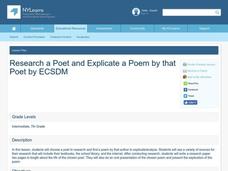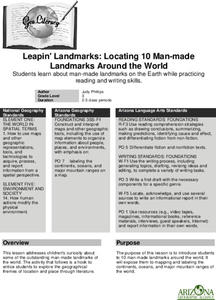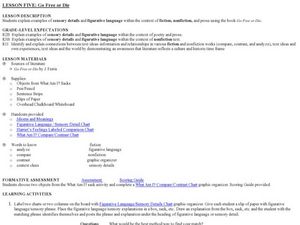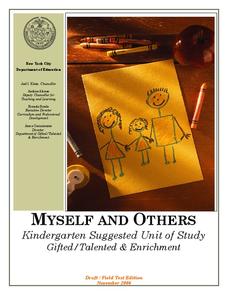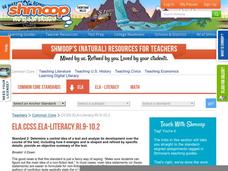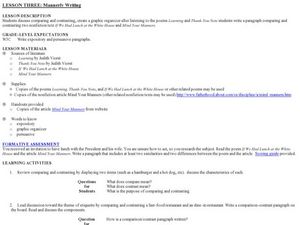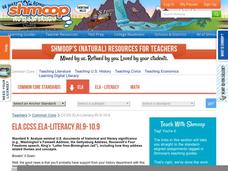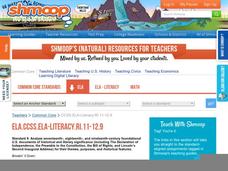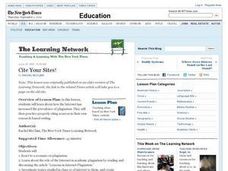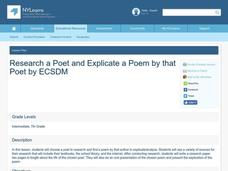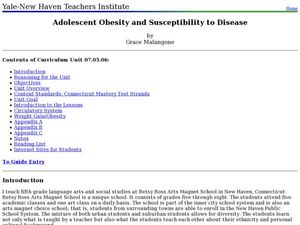Curated OER
Go Free or Die
Groups of older elementary learners begin their study of figurative language by visiting a website and completing the exercises detailed there. They then apply what they have learned by finding examples in several poems. Finally, they...
Curated OER
Research a Poet and Explicate a Poem by that Poet
Using your school's media center, internet research, and a SMART board, 7th graders research a chosen poet and write a research report. Additionally, 7th graders explicate one poem by the poet within their report. Several resource links...
Curated OER
Figurative and literal language through the study of Shakespeare
Sixth graders explore figurative and literal language. They study literary devices through short pieces of Shakespeare's work. Then investigate Shakespeare's works and life.
Curated OER
Leapin' Landmarks: Locating 10 man-made landmarks around the world
Third graders engage in a lesson which addresses their curiosity about some of the outstanding people-made landmarks of the world. They explore the geographical themes of location and place through literature.
Curated OER
Go Free or Die: Figurative Language
Figures of speech, sensory details, and academic language are all targeted while reading Chapter Two of J. Ferris’ Go Free or Die. First, learners engage in an exercise to practice describing with detail. Then, partners use a chart to...
Alpena-Montmorency-Alcona Educational Service District
4th Grade Personal Narrative
Throughout 10 lessons, fourth graders learn how to plan, organize, write, and edit their own personal narratives. In the beginning, young writers come up with ideas of personal experiences and the emotions linked with those experiences....
New York City Department of Education
Myself and Others
Self reflection is an important skill to reinforce in our children, and it's especially helpful to help them realize who they are in the context of their environment. A collection of lessons about self image and community encourage...
Curated OER
Check it Out...Nonfiction Can Be Fun!
Organizing information gathered for a research topic can be a challenge. Read aloud notes you have collected on a topic and use suggestions offer by the class to categorize and sort this information. Partners then follow this pattern,...
Shmoop
ELA.CCSS.ELA-Literacy.RI.11-12.5: Structure of an Argument
Imagine a cross-curricular project that not only rewards learners for examining the textbooks used in their other classes but builds literacy skills as well! Groups compare the formats and writing style in their various textbooks. Teams...
Schmoop
ELA.CCSS.ELA-Literacy.RI.9-10.2
Although the ideas on how to implement the skill RI.9-10.2 are lacking, the assessment would work well for challenging learners to summarize, and identify the main ideas of presidential speeches that are of similar topics. One could use...
Shmoop
ELA.CCSS.ELA-Literacy.W.9-10.9
Encourage your pupils to support their claims with textual evidence, whether is is from literary texts or informational texts. You might use the assignment example, which suggests an assignment on what it's like to be an immigrant in...
Curated OER
Review Parts of a Book
Begin the year with a review of the parts of a book. Exercises in the unit plan ask emergent readers to identify the information on the cover of a book and on the title page, to explain the purpose of a table of contents, and to describe...
Curated OER
Mannerly Writing
Writers draft paragraphs comparing and contrasting the author's viewpoint in two poems. They also discuss the differences between an informational text and a poem regarding manners. Rubric and assessment are provided.
Shmoop
ELA.CCSS.ELA-Literacy.RI.9-10.9
With a nice description of what the standard means, an idea for a class activity, and a quiz with answers, this resource should deepen your (and your pupils') understanding of the targeted Common Core standard. The provided activity is...
Shmoop
ELA.CCSS.ELA-Literacy.RI.11-12.9
Guided by close-reading questions, groups examine the similarities and differences between the Declaration of Independence and the Bill of Rights. In addition, they look at how the principles are presented in these two foundational US...
Curated OER
Cite Your Sites
What information would you find in an almanac that you would not find in an atlas? What is the difference between a dictionary and a thesaurus? Using a Cite Your Sites worksheet on which they record their observations, groups participate...
Curated OER
Research a Poet and Explicate a Poem by that Poet
Seventh graders choose a poet to research and find a poem by that author to explicate/analyze using a variety of sources for their research that will include their textbooks, the school library, and the internet. After conducting...
Pennsylvania Department of Education
Exploring Key Ideas and Details in Fiction and Nonfiction
Third graders participate in activities to differentiate fiction from nonfiction. In this fiction lesson, 3rd graders describe the elements of a fiction story. Students compare and contrast fiction and non fiction elements. Students...
Curated OER
Adolescent Obesity and Susceptibility to Disease
Students understand the importance of maintaining a healthy weight and good health. In this health lesson students read text then create their own pamphlet on the cardiovascular system, weight gain, treatments and health risks.
Curated OER
To Go West or Not to Go West, That is the Question
Students answer the question,"To go West or not to go West?". In this nonfiction lesson students read a piece of nonfiction about going West during the 18th century. Students use a graphic organizer to compare and contrast the pros and...
Curated OER
Cattle Drive
Students explore cattle drives. In this United States history and letter writing lesson, students write a letter to their family predicting possible problems that were encountered by participants in cattle drives. Students design brands,...
Curated OER
Plants are Growing and Changing
Learners explore living things. In this agriculture activity, students read the book A Tree is a Plant and participate in an experiment to explore the patterns of change in living things. Learners continue to observe the plant throughout...
Curated OER
Putting it all Together
Students take notes and summarize information. In this communication lesson, students summarize information by taking notes using the various methods that their instructor presents to them. Students then write summaries of the information.
Curated OER
Making a Non-Fiction Big Book
Writing a non-fiction big book can help students learn about research techniques, note taking, and other skills.
Other popular searches
- Nonfiction Text Features
- Nonfiction Text Structures
- Types of Nonfiction Text
- Features of Nonfiction Text
- Fiction and Nonfiction Text
- Nonfiction Text Elements
- Infer Nonfiction Text
- Parts of Nonfiction Text
- Summarizing Nonfiction Texts
- 6 Nonfiction Text Structure
- Inquiry and Nonfiction Text
- Reading Nonfiction Text



